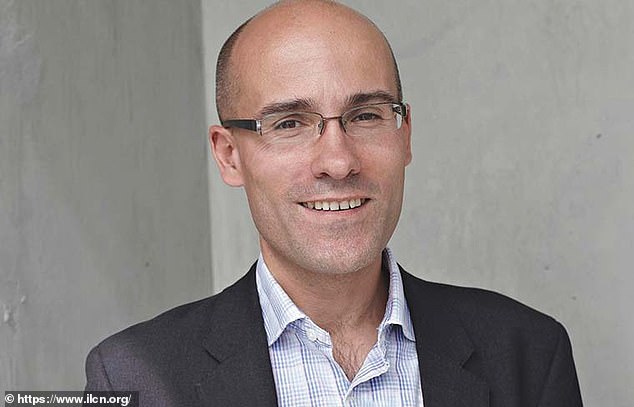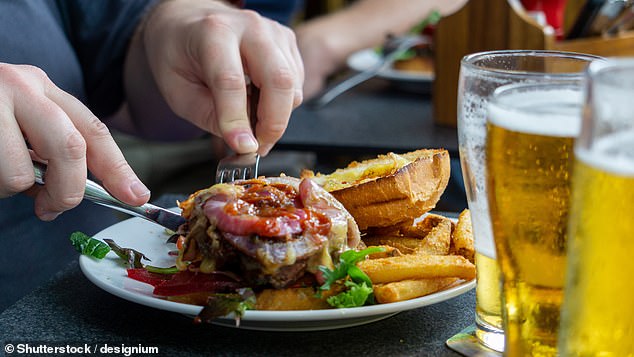Research suggests poor diet and gut health is causing the UK to face a rise in cancer cases among under-50s.
More young people than ever are suffering from cancer, and diagnosis rates have increased by a quarter in two decades.
Around 100 younger people every day (35,000 a year) are diagnosed with a growing number of cancers commonly seen in older people, such as bowel, breast and stomach cancer.
Scientists believe this “disturbing” trend may have a connection to people eating too many ultra-processed foods. Rising cases of bowel cancer, for example, may have an association with changes in the gut microbiome that reduce the body’s ability to deal with precancerous cells, according to research presented at the world’s largest cancer conference.
Poor diet and gut health are causing the UK to face a rise in cancer cases among under-50s, research suggests (stock)

Professor Charles Swanton, Chief Physician at Cancer Research UK (pictured)
Professor Charles Swanton, chief medical officer at Cancer Research UK, said cancer still predominantly affects older people, but scientists are alarmed by its increasing presence among younger people.
Speaking at the annual meeting of the American Society of Clinical Oncology he said: “Over recent decades, there has been a clear increase in cancer incidence rates in young adults in the UK.” He added: “We don’t have a good answer as to why this is happening.”
The incidence rate of ‘early onset’ cases rose from 132.9 per 100,000 people in 1995 to 164.6 in 2019, Cancer Research UK analysis of the latest data shows.
The overall incidence rate across all ages increased by 13 percent, from 539 per 100,000 people to 611.5 during this period.
Research from Ohio State University presented at the Chicago meeting found that those under 50 with bowel cancer had cells that appeared to be 15 years older than their actual age.
It suggests that Western diets are affecting the balance of bacteria and inflammation in the gut, which can lead to “accelerated aging” in the colon.
A bacteria called fusobacterium, linked to diets low in fiber but high in sugar, was found to increase inflammation in the gut, which in turn increases the risk of cancer.
The findings add to growing evidence that diseases can occur through changes in the microbiome, as well as damage caused by long-term inflammation.
He added: “In some cases, associations may emerge that different microbial species may be associated with the risk of early-onset cancer.”

The incidence rate of ‘early onset’ cases rose from 132.9 per 100,000 people in 1995 to 164.6 in 2019, analysis by Cancer Research UK of the latest data shows (stock)
“What we are seeing in some studies is that some tumors from patients with early-onset colorectal cancer harbor mutations that could be initiated by these microbial species.
‘Which suggests that potentially some of these microbes could initiate DNA mutations. This is no different from the way tobacco smoke induces mutations in the cells lining the lungs.’ The global phenomenon made headlines in March when the Duchess of Wales announced that she had been diagnosed with an undisclosed form of cancer following previous abdominal surgery, when she was just 42 years old.
Other high-profile examples include Dame Deborah James, the activist and podcaster who died of bowel cancer in 2022, aged 40, and Girls Aloud star Sarah Harding, who died of breast cancer in 2021 with only 39 years old.
Professor Swanton suggested that scientists were still “somewhat short of proving that those microbial species directly cause cancer”, adding that inflammation of the gut often linked to obesity was also a likely factor.
But the concern is so great that it has led Cancer Research UK to set up a ‘Grand Challenge’ research program to examine this and other possible causes.
He added: “In some cases, associations may emerge that different microbial species may be associated with the risk of early-onset cancer.”
“What we are seeing in some studies is that some tumors from patients with early-onset colorectal cancer harbor mutations that could be initiated by these microbial species.

Around 100 younger people every day (35,000 a year) are diagnosed with a growing number of cancers commonly seen in older people, such as bowel, breast and stomach cancer (stock)
‘Which suggests that potentially some of these microbes could initiate DNA mutations. This is no different from the way tobacco smoke induces mutations in the cells lining the lungs.’ The global phenomenon made headlines in March when the Duchess of Wales announced that she had been diagnosed with an undisclosed form of cancer following previous abdominal surgery, when she was just 42 years old.
Other high-profile examples include Dame Deborah James, the activist and podcaster who died of bowel cancer in 2022, aged 40, and Girls Aloud star Sarah Harding, who died of breast cancer in 2021 with only 39 years old.
Dr. Cathy Eng, a bowel cancer doctor at Vanderbilt University Medical Center in Nashville, said the rise in the disease among those under 50 was being seen around the world and that patients otherwise Healthy people increasingly present advanced bowel cancer between the ages of 20, 30 and 40. .
She said: “They are not necessarily obese or unhealthy looking and you would have no idea they had cancer.”
‘Research has correlated it with high blood pressure, high cholesterol, diabetes and sedentary lifestyles, as well as tobacco and alcohol.
“It’s not necessarily about what you eat, there is also interesting research on antibiotic use and what the body ingests from childhood.”


